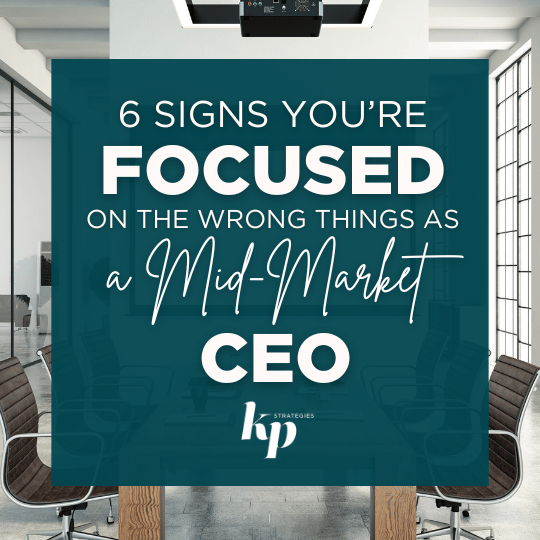
For the next six weeks, we’ll dive deeper into each of the six key areas to ensure you’re focusing on the things only you, as CEO, can do!
Spending Too Much Time “In” vs. “On” the Business
Are you bogged down by day-to-day operations? If you find yourself avoiding social situations, feeling emotionally exhausted, and isolated in decision-making, these are signs that you’re too entrenched in the weeds. Your role is to steer the ship, not row it. This touches on your Personal Effectiveness as a CEO, the first of six key areas that only you, the CEO, can focus on.
Here are a few tips:
Time and Energy – As a CEO, your time and energy are limited each day. What gives you energy? What drains you? Surround yourself with people who understand and protect your time. Delegate tasks that deplete your energy. Prioritize your highest-value work and schedule important meetings when you’re at your best. For example, if you’re a morning person, let your team know that this is the best time for critical discussions when possible.
Your Leadership Model and Perspective – As a CEO, everything you say and do matters. People around you want to please you, which makes it hard to get an unbiased view of reality. Be clear on these points: What do you stand for? What won’t you tolerate? What do you want others to say about you? What legacy do you want to leave behind?
Your Brand – Everyone has a personal “brand.” What’s yours? The longer you’re a CEO, the more blind spots you may develop. Stay curious. Stay humble. Remember, it’s not all about you. Embrace servant leadership and gratitude. Gratitude is a powerful emotion. People who practice gratitude experience improved physical and psychological health, better sleep, stronger relationships, and a desire to give back.
Finally, being a CEO is a lonely job. There are things you simply can’t share with anyone, not even your First Team. Some symptoms of CEO loneliness include: feeling isolated in decision-making, a lack of trust in others, emotional exhaustion, difficulty connecting with people, imposter syndrome, reluctance to show vulnerability, reduced motivation, increased stress and anxiety, trouble balancing work and life, and avoiding social situations. It’s common; 61% of CEOs say loneliness hinders their performance (Harvard Business Review).
One way to combat loneliness is to create an informal peer group, what we call the “Kitchen Cabinet.”
Andrew Jackson coined this phrase when he regularly gathered an informal group at the White House kitchen to offer him an unbiased view of reality—something he knew he couldn’t get from those inside the White House.
As CEO, only you can decide what truly matters. Managing your Personal Effectiveness is the first of six key areas only you can handle! Stay tuned—next week, we’ll dive into the second one.